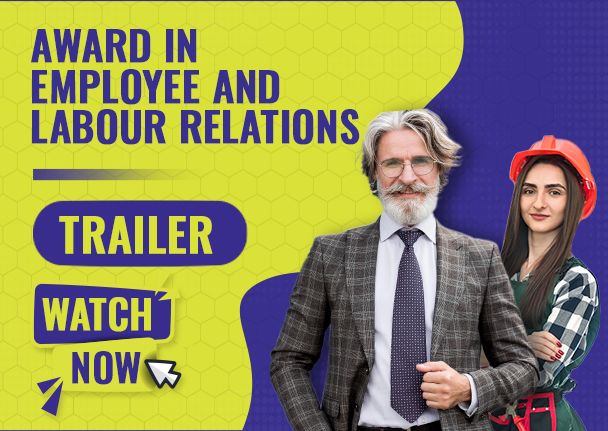Award in Employee and Labour Relations
This module is designed to provide students with a comprehensive understanding of the policies, practices and laws that govern the relationship between employers and employees. Students will learn about key topics such as collective bargaining, union-management relations, employment law, and dispute resolution.
-
OrientationDirector’s Introduction03:27Orientation10:52Understanding Podcasts01:46Understanding Pre-recorded Lectures02:25Understanding Pre-recorded Interviews01:54Understanding Case Studies01:47Understanding Discussion Boards02:30Ascencia Style SheetAI PolicyPolicy for Online Interaction and Behaviour for E-Academic Students
-
Coursework: Employee and Labour RelationsIntroductory Podcast05:02Assessment Podcast02:51
-
All About Employee and Labour Relations; Lecture 1Relevance of Module in Employee and Labour Relations for Students53:46
-
All About Employee and Labour Relations; Lecture 2Part 1: Industrial Employment Relations39:42Part 2: Industrial Employment Relations45:04Part 3: Industrial Employment Relations40:17Part 1: Understanding the Role, Benefits, and Processes of Trade Unions in Malta27:19Part 2: Insights into Organizational Stakeholders and Employment Dynamics in Malta25:49Industrial Employment RelationsJournal article: Platform Work and the Employment Relationship
-
All About Employee and Labour Relations; Lecture 3Part 1: Labour Law & the Code of Conduct53:34Part 2: Labour Law & the Code of Conduct46:19Part 3: Labour Law & the Code of Conduct51:48Labour Law & The Code of Conduct
-
Employee Relations in Practice; Lecture 4E-Signature & Electronic Document Management Systems16:00Part 1: Employee and Labour Relations31:12Part 2: Employee and Labour Relations28:50
-
Employee Relations in Practice; Lecture 5Conflict Resolution Online Solutions23:11
-
Employee Relations in Practice; Lecture 5.5Part 1: Workplace Conflict Resolution and Mediation50:36Part 2: Workplace Conflict Resolution and Mediation01:00:14Part 3: Workplace Conflict Resolution and Mediation52:11Workplace Conflict Resolution and Mediation
-
Employee Relations in Practice; Lecture 6Part 1: Performance Evaluation50:27Part 2: Performance Evaluation52:03Part 3: Performance Evaluation56:51
-
Employee Relations in Practice; Lecture 6.5
-
Employee Relations in Practice; Lecture 7Employee Engagement and Feedback Tools17:21Part 1: Navigating Employee and Labour Relations Involves Grasping Key Insights & Addressing Challenges19:09Part 2: Key Approaches and Future Trends on Strategic and Ethical Employee Relations29:15
-
Employment Relations in the Digital Economy; Lecture 8Part 1: Employment Relations in the Digital Economy41:57Part 2: Employment Relations in the Digital Economy41:49Employment Relations in the Digital Economy
-
Employment Relations in the Digital Economy; Lecture 9Part 1: Diversity and Inclusion in Employment Relations37:34Part 2: Diversity and Inclusion in Employment Relations35:09Part 3: Diversity and Inclusion in Employment Relations48:46Part 4: Diversity and Inclusion in Employment Relations51:03Diversity and Inclusion in Employment RelationsJournal article: Diversity Interpretations, Management Practices and Inclusion Perceptions in the Workplace
This module is designed to provide students with a comprehensive understanding of the policies, practices and laws that govern the relationship between employers and employees. Students will learn about key topics such as collective bargaining, union-management relations, employment law, and dispute resolution. Students will gain the knowledge and skills necessary to navigate the complex legal and regulatory environment that governs employment and labour relations, and to develop and implement effective policies and practices that promote positive relationships between employers and employees.
Programme Outcomes
- Provide expert contribution to the development of HR policies and practices that align with employment and labour relations objectives.
- Students who have no training in the field must have completed a bachelor’s in a relevant subject or have completed an MQF/EQF Level 6 qualification. However, students’ circumstances and experiences may also be considered during the application process—five years of relevant working experience in the industry of specialization.
- Similarly, students applying for the course need to be fluent in English since the course is taught in English. Therefore, proof of B2 level of English should be provided by the students upon application – IELTS level/grade 6 or the student’s country equivalent.
- A Bachelor’s degree or graduate degree in humanities, sciences, human resources, organisational behaviour, business, administration, management, communication, journalism, psychology, arts or a related field.
- Minimum 180 ECTS at MQF/EQF Level 6 previously acquired at a Higher Education institution.
- Outstanding written and oral communication skills.
- A minimum of one year of work experience in a business environment will be considered as an asset.
Course Syllabus Podcast
Gain a Comprehensive Understanding of the Course Syllabus with Our Informative Podcast.
- Exam - 2 hours - 25%
- Essay - 75%
- E-portfolio
- You can submit your assessment at any time during the course.
What’s included
-
Duration :Full Time - 3 Months
Part Time - 6 Months - Learning: 100 +Hours
- Certificate

